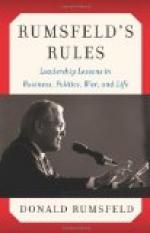THE NATION’S PROBLEM
December 14th, 1899
The failure of Lord Methuen’s attack at Magersfontein has brought home to every mind the extreme gravity of the situation in South Africa, and it seems most likely that in the western theatre of war the crisis has issued in a decision unfavourable to the British cause.
It is well to keep the whole before our eyes even when examining a part, so I begin with a bird’s-eye view. In Natal Sir Redvers Buller seems to be ready, and to be about to strike, for the advance of Barton’s brigade towards Colenso must be the prelude to the advance of the main body to the right or the left to cross the Tugela above or below the broken railway bridge. If Sir Redvers Buller is so fortunate as to bring the principal Boer army to an action and to defeat it so thoroughly as seriously to impair its fighting power, the balance in the eastern theatre of war will have turned, and attention may be concentrated upon the restoration of the position in the west. There the balance has turned the wrong way. General Gatacre’s defeat at Stormberg would not be a very serious matter, for his force was small, were it not that it damages the credit of British generalship, and that it must have given a great stimulus not only to the Free State army but to the rebellion of the Cape Boers. For the Boers Stormberg is a great victory, which will encourage them to fresh enterprises in a country where at least every second Dutch farmer is their friend and ally. They may, therefore, be expected to turn their attention as soon as they can to Lord Methuen’s communications. This probability rendered Lord Methuen’s position at Modder River doubly critical. On Sunday he was ready, and set out to test his fate. On Tuesday he was back again in his camp, the measure of his defeat being given by his assurance that in his camp he was in perfect security. Those are ominous words, for they have not the air of the man who does not know that he is beaten, and who means to try again at once. It is, however, conceivable that, as the defeat seems to have been caused by an inexplicable blunder, the marching of a brigade in the dark in dense formation close up to the muzzles of the enemy’s rifles, the effort may be made to attack again with better dispositions. A second attack would, of course, be attended with twofold risks, but if it has no chance of success the defeat already suffered must be reckoned a disaster. If Lord Methuen is definitely beaten, Kimberley must be set down as lost, and the question is of the safety of Lord Methuen’s division. In that case to remain at Modder River is to court investment, which would last for many weeks. The risk would not be justified unless there is in the camp an ample store of supplies and ammunition, and even then it is not clear what purpose it would serve. If, therefore, the defeat is decisive the proper course is a retreat to a position




